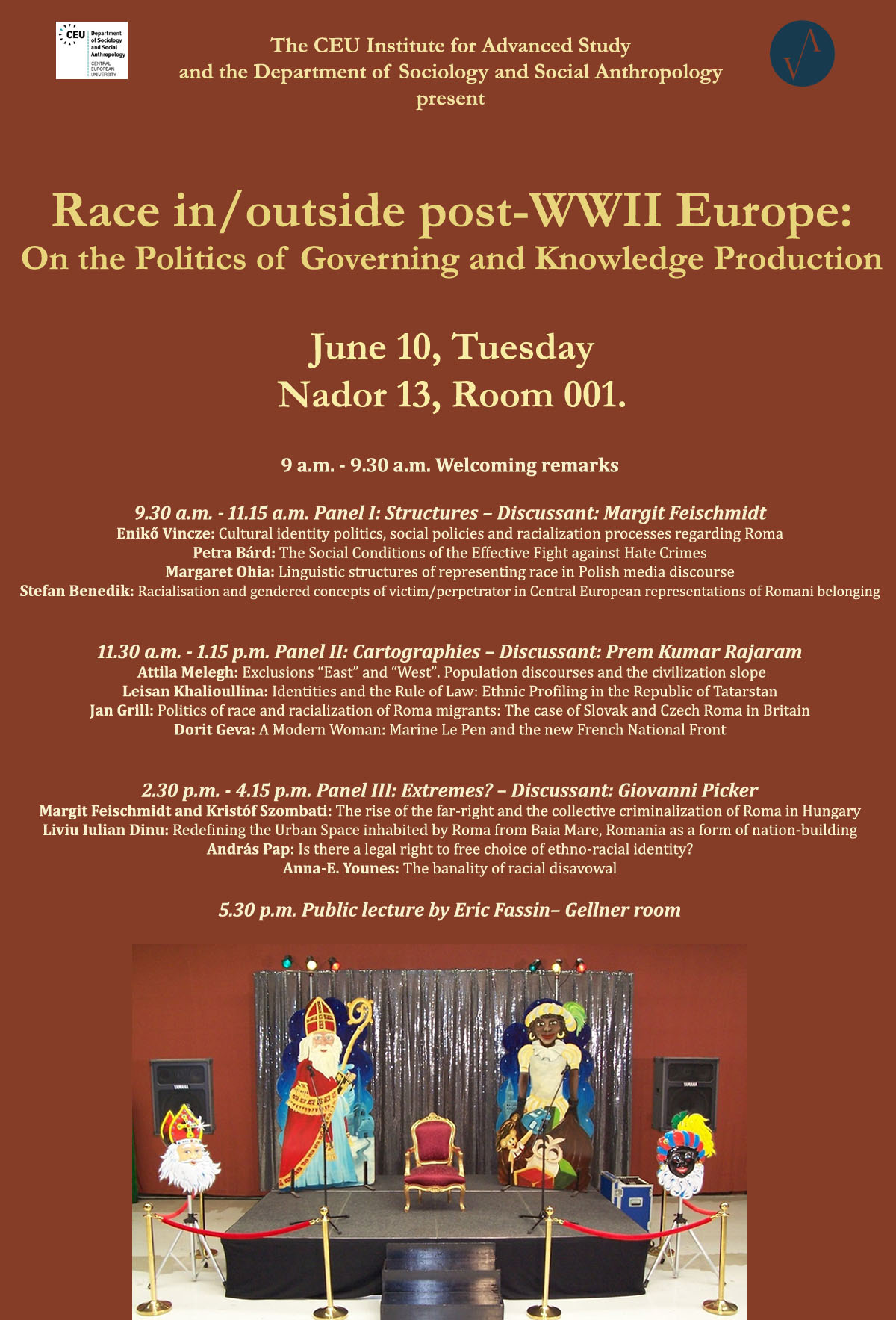Race in/outside post-WWII Europe: On the Politics of Governing and Knowledge Production
Alana Lentin’s idea that “The holocaust was Europe’s tragedy. Colonialism someone else’s.” (Lentin 2008: 495) synthetically captures a widely accepted yet rarely spoken assumption. Far from opposing the two “tragedies”, Lentin’s claim calls for a consistent reflection not only on Europe’s selective memories, but also about contemporary approaches to social heterogeneity.
Outside the UK, after WWII, both policy and academic discourses have largely been ignoring the concept, and more generally the language, of race. Framing social heterogeneity in ethnic or cultural terms, deploying for instance the concepts of “multiethnic” and “multicultural” societies, has gained a significant consensus. More recently, the idea of “superdiversity” (Vertovec 2007) highlighted the need of considering different forms of diversity conjointly, such as class positions, spatial distributions, gender and age profiles, etc. Some have argued that neglecting race prevents questioning certain assumptions that may lay behind racism, and talked about "racism without races" (Balibar 1991). Others have warned against the reification that race would acquire among the public, if used in policy and/or academic discourse (Rivera 2011). Recent political events have emphasized the debate: for example, the summer 2008 Italian Government's count and collection of biometric data of Roma, and the spring 2013 French National Assembly’s decision to remove the words "race" and "racial" from national law books.
Within this framework, the present workshop raises the fundamental question of how to better approach social heterogeneity in Europe, focusing in particular on policy (the politics of governing) and scholarship (the politics of knowledge production). It aims to create a convivial dialogue among junior and senior scholars from a variety of disciplinary backgrounds. Interventions crossing disciplinary boundaries within the social sciences and the humanities are especially welcome.
Worskhop Program
9.00-9.30 Welcoming remarks
9.30-11.15 Panel I: Structures – Discussant: Margit Feischmidt (Social Sciences, Hungarian Academy of Sciences)
Enikő Vincze (Social Anthropology, Babes-Bolyai University, Cluj-Napoca): Cultural identity politics, social policies and racialization processes regarding Roma
Petra Bárd (Legal Studies, CEU): The Social Conditions of the Effective Fight against Hate Crimes
Margaret Ohia (Institute of Polish, University of Wroclaw and Center for African Studies, UC Berkeley): Linguistic structures of representing race in Polish media discourse
Stefan Benedik (Gender History, University of Graz): Racialisation and gendered concepts of victim/perpetrator in Central European representations of Romani belonging
11.15-11.30 Coffee break
11.30-13.15 Panel II: Cartographies – Discussant: Prem Kumar Rajaram (Sociology and Social Anthropology, CEU)
Attila Melegh (Sociology, Corvinus University): Exclusions “East” and “West”. Population discourses and the civilization slope
Leisan Khalioullina (Institute of Economics, Management and Law, Kazan): Identities and the Rule of Law: Ethnic Profiling in the Republic of Tatarstan
Jan Grill (Social Anthropology, University of Manchester): Politics of race and racialization of Roma migrants: The case of Slovak and Czech Roma in Britain
Dorit Geva (Sociology and Social Anthropology, CEU): A Modern Woman: Marine Le Pen and the new French National Front
13.15 - 14.30 Lunch
14.30-16.15 Panel III: Extremes? – Discussant: Giovanni Picker (CEU IAS)
Margit Feischmidt (Social Sciences, Hungarian Academy of Sciences) and Kristóf Szombati (Sociology and Social Anthropology, CEU): The rise of the far-right and the collective criminalization of Roma in Hungary
Liviu Iulian Dinu (Roma Access Program, CEU): Redefining the Urban Space inhabited by Roma from Baia Mare, Romania as a form of nation-building
András Pap (Legal Studies, Hungarian Academy of Sciences and CEU): Is there a legal right to free choice of ethno-racial identity? Legal and political difficulties in defining minority communities and membership boundaries
Anna-E. Younes (Social Anthropology. IHEID Geneva): The banality of racial disavowal
17.30 Public lecture by Eric Fassin (ENS, Paris) – Gellner room

